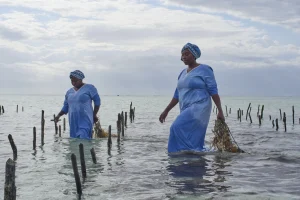Alnour: Accessibility in Morocco powered by design
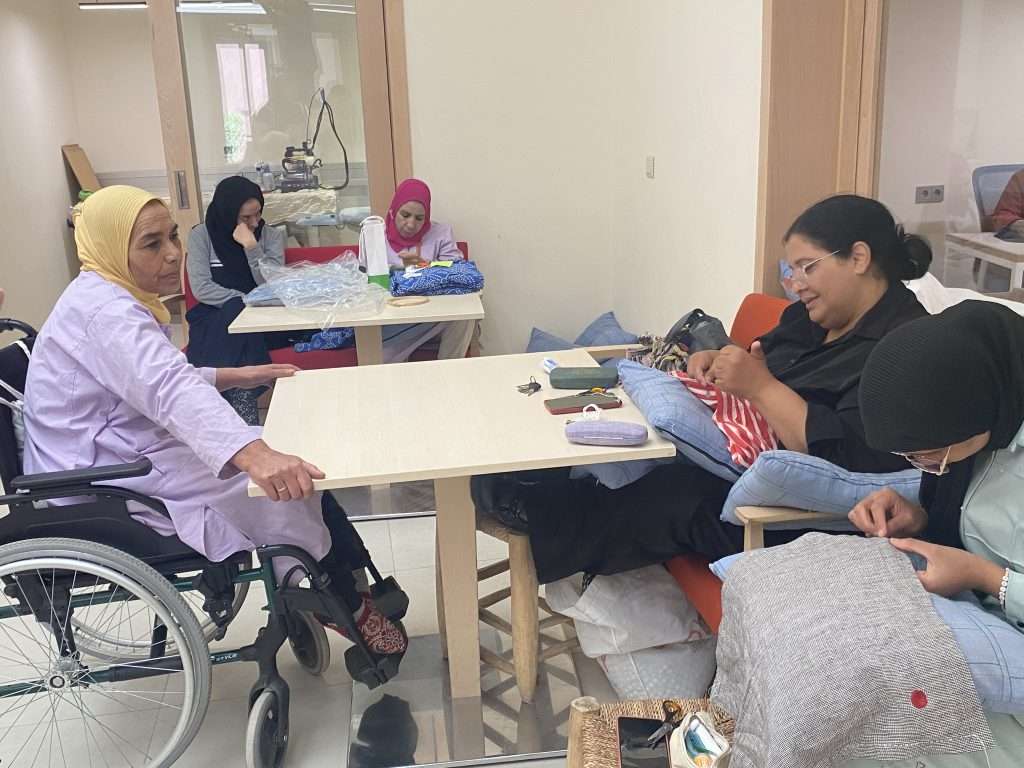
Workers of the Alnour workshop creating textiles, Medina, Marrakech
Almost 2 million people in Morocco are disabled. Struggling to make ends meet paired with the lack of help from the country itself, many are forced onto the unforgiving streets. However, a textile shop called Alnour took it into their own hands and created a business for people who are disabled and brought them into the workforce.
Accessibility within Morocco for disabled people is almost non-existent. As the cobblestone streets of Marrakesh are filled with handicapped people begging for help, essential buildings like shops, pharmacies and restaurants lack basic facilities like ramps or wider door frames, meaning many disabled people are then left helpless living in their own country.
In 2014, disability statistics provided by the Moroccan Census identified 5.1% of the Moroccan population as disabled, accounting for 1,703,424 people. The primary obstacles facing social acceptance for Moroccan disabled people “stem from social stigmatisation, deeply ingrained discrimination and a widespread lack of awareness by a significant portion of the population,” reports Disabilityin.org. However, some hope for those disabled can be found along the narrow and colourful alleyways of the Medina.
Alnour
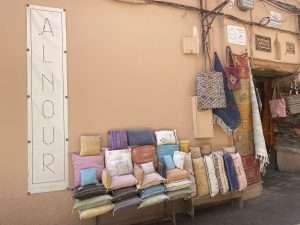
Five minutes from the heart of Morocco’s old town lies a quaint little shop called Al-Nour, which means ‘the light’ in Arabic. It is filled with wonderful hard-working women who specialise in traditional embroidery of Moroccan shawls and dresses, home textiles and a wide range of accessories.
The growing business was created in 2013 and is already expanding. Among the 50 women who work with the textiles, 78% have some form of disability. The business helps to provide for these disabled women, giving them the opportunity of a self-determined life rooted in dignity and independence. The building in which they work is 100% accessible, with ramps, elevators, disabled bathrooms and wider doorframes- something that is almost foreign in Morocco.
Social Enterprise
The organisation has two essential foundations, it is not only a professional workspace, but a personal one too. The social enterprise facilitates training programmes for women and children of all ages teaching French and English language to help the women converse with foreign customers, as well as artisan skills in traditional embroidery and math skills for those who were not able to attend school.
According to the Centres for Disease Control and Prevention (CDC) around 73% of disabled people living in Morocco did not receive an education, with only 15% reaching primary school. This means that the education given to these women in the workshop, not only in embroidery skills but also in basic learning, can be life changing.
Upon our visit on the 2nd of May, the building was under construction to expand the workspace for the women to become a bustling hub of creativity, hard work and filled with the spirit of Al Nour. It helps educate disabled women on their rights and to enable them to live an independent life. Latifa, an embroidery worker with a motor disability spoke on Al Nour’s Instagram page about her gratitude for the business. She stated “Thanks to God and thanks to Alnour, my life has changed a lot! I started to hear new terms such as integration, independence and know-how,” personifying the essence of the new-found voice given to these disabled women living within Morocco.
Before their work begins at 9:30 am in the workshop, a “bus that is adapted to fit women with disabilities” arrives at their homes in the morning to take them to work, stated Yasmine Chakir, who is the project manager for the social enterprise. As Yasmine explained, the hired transportation is paid for by the social enterprise and also takes them home from work.
Yasmine comes to work fully equipped to deal with any emergencies the women of the workshop may have. She stated, “My work is with women with physical disabilities. If a woman needs a wheelchair, I get it for her or if she needs medicine, I will get that for her.”
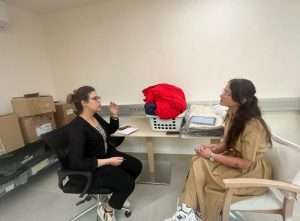
Though Yasmine is able-bodied, she stressed how Morocco as a country leaves many disabled people at a disadvantage as most of the country is inaccessible. She believes in helping women with disabilities to grant them an education, a workspace and to know their rights, “We still have many problems for people with physical disabilities, this is why we have created the association,” she added.
Al nour is the first and only social enterprise that exists within Morocco, as Yasmin explained, “the concept of social enterprise in Morocco doesn’t exist.” She described their Founder, Patricia Kahane, as a “hero” for having the courage to set up the social enterprise. “Patricia saw that there was a problem for disabled people living in Morocco and decided to help,” said Yasmine fondly. The construction team were working on a second on-site nursery, to help the mothers of the workshop focus on their designs while their children are close by and in good hands, Yasmine stated that she loves kids and likes to play with the nursery children during her breaks. The social enterprise hired staff to take care of the children as well as professional chefs for the spacious and modern kitchens. Every day, the workers in the shop as well as their children sit down to free breakfasts and eat traditional dishes such as M’smmen’s and baghir’s. At 12 pm they sit down for a free lunch, cooked with fresh ingredients, the chefs make traditional Moroccan meals such as delicious tagines and couscous on Fridays.
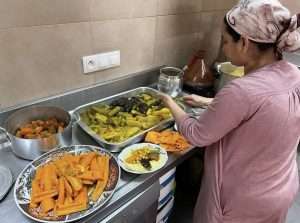
The women within this close-knit workspace all have close bonds with each other. “We have great relationships with all of the women because we work all day together and when we sit down to eat, we eat together,” Yasmine described “we are all equal.” She stressed the absence of hierarchy within their establishment as beyond the different roles the women have, they are all friends as they are surrounded by an atmosphere of contentment.
Yasmine also works on various fundraising programmes to fuel the social enterprise. All the money for transportation, medical coverage, food, wheelchairs and the nursery come from fundraising set up with other organisations.
The architecture of the building is allegorical, with a fully open skylight created to embody “the light” of Al Nour, whilst maintaining the traditional Moroccan riad structure. The administrative assistant to the association, Lalla Khadija Id Bella, described the symbol as “the light of the women’s life,” granting them a role within the community as well as healthcare, full accessibility and a greater quality of life.
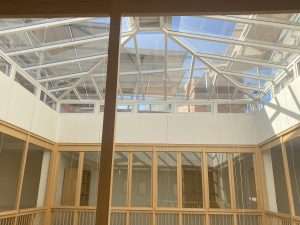
Beyond the workshop and the social enterprise, “we participate in national and international conferences for the rights of women and the rights of people with disabilities” stated Yasmin. She has attended the Zero Projects conference twice with some peers from Alnour, which is an annual event to shine a “spotlight on inclusive solutions from around the world,” according to the ZeroProject website. Yasmine described the experience as “great” because “we meet people from all over the world and discuss all of the solutions for people with disabilities and the new technologies,” all while spreading the word of Alnour.
The workshop
After the women arrive at the workshop funded by the social enterprise transport, their work begins at 9:30 am. Using high-quality fabrics in natural fibres (cotton, linen, wool, silk, cashmere) they create products that interpret the local arts of traditional embroidery with modern patterns, shapes, and designs.
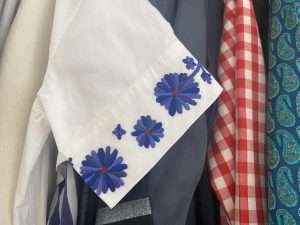
Each woman plays to their strength, some women work in production and planning, most women practice and master the traditional embroidery, while others cannot work with a needle and thread and are trained to do the ironing, creating the most intricate fringes and designs.
We had the pleasure of meeting Al Nour’s secretary, Noura Nouam who is a short person with scoliosis and was very cheerful and elegant. Her workspace is adapted so she can sit comfortably at her desk and work on her computer dealing with the promotion and sales of their beloved workshop. “Being a very open and social person I was able to achieve my objectives: I am autonomous and have achieved self-development at a personal and professional level… I really love Alnour’s children’s clothes!” Noura stated in a post on Alnour’s Instagram page.
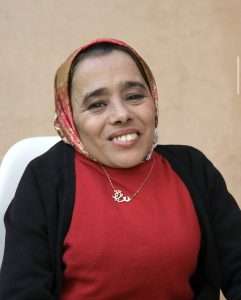
The textiles produced from the workshop are very popular throughout Marrakech as they meet “a lot of customers” per day, described Yasmine. Alnour was able to collaborate with local partnerships where an exclusive selection of their products can be found in other shops such as Jardin Secret, Riad ElFenn and Royal Palm. Working with international designers, in partnership with the association, Alnour also has plans to expand to customers in Germany and France.
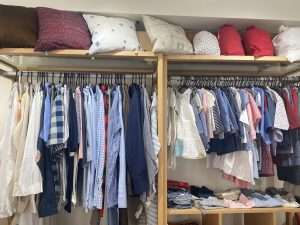
In the 11 years that Alnour has been in business, it has revolutionised the workspace for people with disabilities living in Morocco. It has helped these women understand the value of self-confidence, hard work and determination, all while granting them a higher quality of life, despite the inaccessibility of Morocco as a country. Though it only helps a very small portion of Moroccan people with disabilities, we can only hope that with the success of this model social enterprise, there will be more to follow to help the other nearly 2 million living in the country achieve a better life.
Want to chase the pulse of North Africa?
Subscribe to receive our FREE weekly PDF magazine









